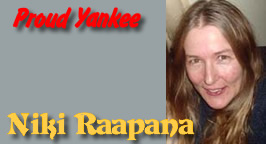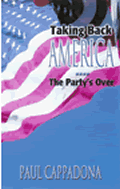Other
Raapana
Articles:
CAFTA, the EU & Communitarian Law
SPECIOUS VISIONS
By Niki Raapana
March 19, 2006
NewsWithViews.com
From sea to shining sea, America is changing the structure of local government. Our constitutional republic is rapidly changing into a communitarian system of law. New laws are introduced every day that incorporate a vague set of "community" values.
U.S. law was established to protect and maintain individual rights. Our states logically deduced that's the only legitimate purpose for a federal government. A communitarian system of values balances individual rights against community rights.
As the founder of communitarianism puts it, "The last thing a communitarian calls for is to abolish any right, let alone privacy. But no right is absolute and all must be balanced against the common good." (Balancing Individual Rights and the Common Good, by Amitai Etzioni, Tikkun, Vol.12, No.1, (January/February 1997), pp. 66-67.)
Community justice is replacing constitutional justice at every level of American society. Community is the buzzword justifying all the drastic changes to American law. Yet not one person involved in Rebuilding Livable Communities can give it a clear definition.
For most of us, the meaning of the term "individual" is fairly clear. Quite the opposite is true of the political term "community." It couldn't be any more vague. Ask ten people what the definition of community is, and you're likely to get ten different answers.
A community can mean anything from a large regional organization to a large city to a rural outpost. It can define a group of people who play the same games or sports. It can be used to denote a way of thinking that depends on the attitude of the person thinking it.
To a Russian, the term community can define a tightly controlled communist collective or a loose group of revolutionary anarchists. To an American, community can define their neighborhood or their internet friends. Online communities, religious communities, and biker communities�all are included in this vague, all encompassing descriptor.
Internationally, community is used to define the growing European Union of formerly independent nations. The European Community requires all member nations to give up their sovereignty. All EU citizens live under the supreme authority of Community Law.
Regional Community Law (CAFTA) was adopted by the U.S. Congress in 2005.
Working deftly behind the scenes is Amitai Etzioni's obscure Communitarian Network.
He directs "a coalition of individuals and organizations who have come together to shore up the moral, social, and political environment. We are a nonsectarian, nonpartisan, transnational association...The Communitarian Network investigates issues and policies such as the balance between rights and responsibilities in society, community justice, multiculturalism, the community's moral voice, and developing global society."
Locally, community is used to define the collective mindset of everyone in the world. A community "minded" person is someone who "cares" about global community "values."
What it represents to communitarians is: self-appointed elites who claim the more moral voice in order to build a global government system that will over-rule all national laws.
Tibor R. Machan tried to define community in a September 1991 article, The Individual and the Community published in The Freeman: Ideas on Liberty - "Communitarians wish to place community and individual on a collision course, saying there is some kind of balance that is needed between the rights of individuals and the rights of the community. But if we consider that "community" means simply a lot of other people than oneself, this makes for majority rule. And if we consider that such other people usually leave it to a few who will speak out in their behalf, we will have a few community representatives dictating to the rest of us what we must do and what our "responsibilities" are."
The first responsibility each community has is to a vision process called a "visioning."
The specific "need" for change varies from place to place, but they all have one important theme in common. Without fail, every new plan for reorganizing a new global-to-local American government is always presented as a locally motivated vision of "what the community wants." They all claim the community agreed the changes were "necessary."
But the truth of the matter is, wherever the visioning process is happening it's the rare local resident who has any idea what's really going on in their local, county, state or national "communities." Each level of community has it's own level of visioning.
Seattle, Washington started their visioning meetings in the early 1990s. The Roosevelt Neighborhood Plan was "validated" by thirty-five committee members in 1999. None of the 5000 residents in the neighborhood publicly debated or voted on their plan.
According to the legal adoption records of Seattle City Council, the whole community wanted the plan. After three years of interviews I never found one single person in my neighborhood who knew that. Everyone I talked to about it asked me, "What plan?"
In Anchorage, Alaska, where we live now, the visioning is in its final stages. In Berthoud, Colorado, a small bedroom community outside Denver, the process has just begun.
Envisioning Berthoud is an exact replica of all envisioning going on across America. The meetings are organized by local public officials, but they're always led by professionals.
Non-resident planners and developers use the input of local residents to make important decisions that "must be made" to either save the environment, create a safe and livable community, or to direct growth and control sprawl. The important decisions being made by the planners and community developers are nothing less than plans to regulate or take outright control of all private and public land within their community sphere of influence.
Outsiders who lead the local meetings are from rich non-profit organizations. Trained in communitarian jargon, influential professionals take values' surveys to manipulate local residents who show up at the meetings. Americans react differently to the new language. Some get confused enough to ask the right questions. Others may mention the need to protect the rights of the local individuals. But if they so much as whisper of their state or federal constitution, they are quickly silenced for hanging onto such outdated beliefs.
Communitarians "shore up" individuals who cling to the idea of individual liberty. Our hired leaders claim that "land use planning is an essential act of democratic citizenship." They believe "environmental quality and a community's quality of life go hand in hand..."
In Berthoud, the vision is needed because of the uncertainty of the future. In Seattle and Anchorage, a revised land management plan was needed to "improve the quality of life."
Our Anchorage vision has Parks and Recreation in charge of controlling all private land within city boundaries. It's called an enhanced system. They're reorganizing the entire Parks Department into a private-public partnership with community developers.
The vision calls for dividing Anchorage into five new park sub-areas called "Community Activity Centers." It amends land use regulations and other relevant plans to incorporate policies and procedures for "natural resource space." This includes acquiring all land on both sides of every major stream and creek, "as it becomes available."
They're "planning with purpose" to identify critical lands that "need to be acquired." It's all nicely combined with the Living With Wildlife Plan. It includes a Trail Watch Group and an appointed Citizen Advisory Board. It plans to "balance individual growth."
According to the Anchorage, Alaska Office of Economic and Community Development, "Citizens want to see their dollars at work stewarding and enhancing the parks and recreational programs they care about and improving Anchorage's quality of life."
An ongoing ACL survey with 937 responses shows ten percent of the visitors who vote at our site support eliminating the U.S. Constitution in favor of Communitarian Values.
Anchorage 2020 planning is in the final stages. Public comments end March 24, 2006. Last I checked there were no comments posted online. So, how many local Anchorage residents approve of the lasting Anchorage 2020 vision for their future? I'm guessing that it's about ten percent. Coincidentally, there's a proposition in April that asks Anchorage voters to authorize the City to improve and expand their parks. It doesn't ask them if they want to entirely reorganize into a communitarian system. Voters might say no.
Community Local Agenda 21 plans are an essential tool for a communitarian system.
|
Subscribe to the NewsWithViews Daily News Alerts! |
Our constitutions do not allow for this process. The only legal formula for modifying U.S. constitutional law is through the U.S. state's constitutional amendment processes.
(Special thanks to Michael for his contributions on Berthoud's Visioning.)
Niki Raapana has just completed her first book about the global communitarian vision. 2020 is a short (29,457 words) introduction to community law, community police, and community development. It has source references imbedded in a fairly easy, biographical narrative. The appendix includes a glossary of 2020 terms and other practical tools. The ACL's soft-cover edition of 2020 can be ordered by contacting Niki Raapana via email, or snail mail your shipping address and a check or money order for $12.00 plus $3.00 S&H per book to: Nordica Friedrich, P.O. Box 231941, Anchorage, Alaska, USA 99523.
� 2006 Niki Raapana- All Rights
Reserved
Niki Raapana was trained in government document research at the University of Massachusetts, Amherst. Raised by a career Army NCO, she traveled the U.S. most of her life. Her dad taught her it is every American's job to defend the rights of people who are unable to defend themselves.
After her landlord complained that the city was out to steal his land, Niki agreed to study Seattle's development plans for him in March 1999. In September 1999 she found out the city planned to do a lot more than steal Hugh's land. She identified the Communitarian Network's connection to the plans in March 2000.
Niki filed many public disclosure requests for Hugh Sisley and in the fall of 2001 the City of Seattle ceased actions against his properties based on Niki's research. By 2002 she had provided 2500 documents for Dawson et. al. v. The City of Seattle et. al, a 4th Amendment lawsuit currently under consideration before the Ninth District Court of Appeals.
Niki
co-founded the Anti-Communitarian League with her (then) teenage daughter
Nordica, in April, 2001.
E-Mail: nikiraapana@gmail.com
Communitarians "shore up" individuals who cling to the idea of individual liberty. Our hired leaders claim that "land use planning is an essential act of democratic citizenship." They believe "environmental quality and a community's quality of life go hand in hand.."













